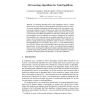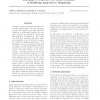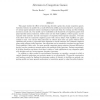234 search results - page 7 / 47 » A polynomial-time nash equilibrium algorithm for repeated ga... |
SAGT
2010
Springer
14 years 10 months ago
2010
Springer
Can learning algorithms find a Nash equilibrium? This is a natural question for several reasons. Learning algorithms resemble the behavior of players in many naturally arising gam...
ICML
2003
IEEE
16 years 11 days ago
2003
IEEE
Learning in many multi-agent settings is inherently repeated play. This calls into question the naive application of single play Nash equilibria in multi-agent learning and sugges...
CORR
2008
Springer
14 years 11 months ago
2008
Springer
This paper studies the effects of introducing altruistic agents into atomic congestion games. Altruistic behavior is modeled by a trade-off between selfish and social objectives. ...
ICML
1998
IEEE
16 years 11 days ago
1998
IEEE
In this paper, we adopt general-sum stochastic games as a framework for multiagent reinforcement learning. Our work extends previous work by Littman on zero-sum stochastic games t...
105
click to vote
FOCS
2008
IEEE
14 years 11 months ago
2008
IEEE
We consider markets in the classical Arrow-Debreu model. There are n agents and m goods. Each buyer has a concave utility function (of the bundle of goods he/she buys) and an init...



